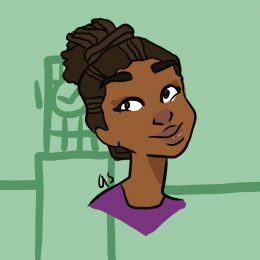
My relationship with race has always been far more complex than necessary. I am a proud black daughter of two amazing black parents, but I always struggled with feeling black enough.
I’ve never really figured out what that meant — to be black enough. Can you quantify your identity?
From the day in second grade when a boy named Julius informed me that I was “an Oreo,” I’ve been trying to figure that out.
During elementary school, I was pretty good at brushing it off. Fourth graders don’t spend too much time discussing race, so I didn’t really need to think about it. Middle school was when I got really self-conscious. My friend group was predominantly black and for years I felt the need to prove my blackness to them. I watched “106 & Park” like it was the word of God, bought a pair of Pastry sneakers and spent more time than I’d like to admit memorizing the words to Nicki Minaj’s “Roman’s Revenge.”
Though I enjoyed these things, I didn’t do them because I enjoyed them. I did them because I felt like an impostor without them.
Fast forward through high school when I got myself together and embraced who I was and didn’t care what people thought. I had a solid friend group who loved me for who I was, and I felt great about myself.
Coming to Binghamton University was when it got weird again. All of those feelings of not being black enough began to creep back up. I didn’t have friends who understood me anymore; everyone was new. I didn’t have any black friends, which was mainly because I made zero effort to make friends outside of the people who lived in my suite. I began to feel like all the other black kids on campus with their black friends could smell my inadequacy from a mile away.
Instead of making more friends, I decided to take an academic approach to finding my blackness: I declared an Africana studies minor.
Surely the girl who can explain W.E.B. DuBois’ concept of double consciousness and discuss with ease how much early 20th-century literature hypersexualized and objectified the black female body can feel like she’s earned her black card.
Right?
Wrong.
No matter how much I align myself with habits that are deemed “black,” I will only feel adequately black when I realize that being adequately black doesn’t exist. No one can act or speak like a color. Though there is a shared identity of the black experience, there is no singular identity that you need to adopt to be a certain race.
The only identity I need to assume is my own.
I can love the 2005 Keira Knightley version of “Pride and Prejudice” while being aware of how problematic Jane Austen’s omission of colonization and slavery is. I can date a white boy and still put my bonnet on at night when he sleeps over. I can be editor of a publication like PRISM without feeling like the job should go to someone blacker. I can unapologetically be my fabulous self without checking to see who’s watching.
I’d love to end this by saying I’ve overcome my initial feelings and have wholly accepted who I am, but self-love doesn’t happen overnight. I don’t know if that little judgmental voice will ever leave my head, but I know that day by day, I’m getting better at tuning her out.
To everyone I’ve ever had the pleasure to love, thank you for loving me back.
Thank you to my Pipe Dream family. You all have given me a space where I felt I could be myself and share my voice. None of you ever probably realized it, but that office has been my safe space for the last few years and I can’t imagine college without Pipe Dream. Rachel and Georgia, you are both so fierce, smart and driven and I’ve loved having this time to learn from you and absorb your energy. Noah, Cory and Kevin, thank you for indulging all of my ideas and Slack messages, putting up with my constant questions and not making me feel worse for holding you all in the office until 4:30 a.m. for PRISM production. Sarah, Daquan and Tykeem, you three are so amazing and talented and I can’t wait to see what you do with PRISM.
Thank you to my East Gym fit fam for giving me the opportunity to teach, grow and learn. I will carry group fitness in my heart forever and will never stop teaching.
Patty, Nimi and Awa, thank you for loving me and keeping sane and happy while in London.
Simone, Julie and Vicky, I love you all endlessly. Thank you for giving me enough friendship and attention that I could comfortably be antisocial.
Logen, I like you and I’m excited to keep liking you.
Kara Jillian Brown is the PRISM editor and an assistant arts & culture editor.


